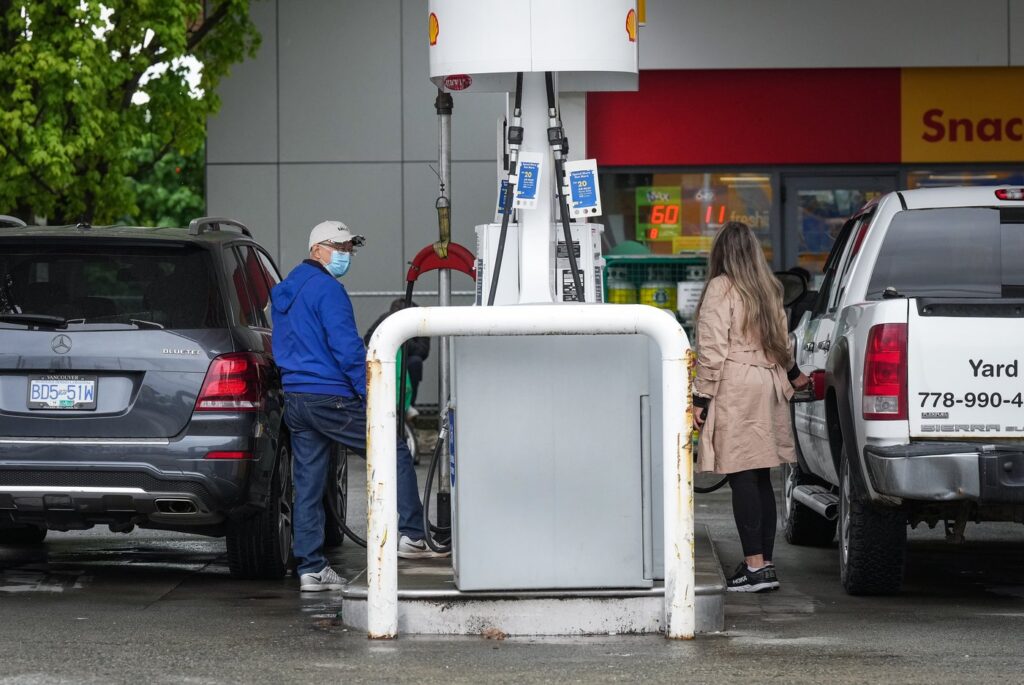
People fuel up vehicles at a Shell gas station after the price of a litre of regular grade gasoline reached a new high of $2.28, in Vancouver, on Saturday, May 14, 2022. Canada’s new emissions standards for gasoline and diesel will allow oil companies that get a federal tax break for installing carbon capture and storage systems to generate credits based on those systems, which they can then sell to refineries and fuel importers. THE CANADIAN PRESS/Darryl Dyck
Canada’s new emissions standards for gasoline and diesel will allow oil companies that get a federal tax break for installing carbon capture and storage systems to also generate credits based on those systems, which they can then sell to refineries and fuel importers.
Cabinet approved the final regulations for the Clean Fuel Standard last week and The Canadian Press obtained them Monday ahead of their intended publication July 6.
The regulations require Canadian companies that produce or import gasoline or diesel to register as “primary suppliers” and then show how they are ratcheting down the life cycle emissions for the fuels by a fixed amount every year until 2030.
Life cycle emissions include every greenhouse gas produced from initial extraction, through refining, upgrading and transporting, to their final use such as to power a vehicle.
To comply with the new standards, companies need to show that they have reduced the life cycle emissions the required amount through a variety of activities, including buying credits from other companies along the life cycle chain that have reduced their own emissions.
Those credits can come from things such as building electric vehicle charging stations, replacing coal or natural gas power plants with renewable electricity sources, producing and distributing biofuels, or investments in clean technology including carbon capture and storage.
Carbon capture projects that benefit from the new federal tax credit — worth 50 to 60 per cent of the project’s cost — can also generate Clean Fuel Standard credits for sale.
“So they’re double counting,” said NDP environment critic Laurel Collins.
Collins said the Clean Fuel Standard is an “essential” tool to drive investments and conversions to renewable energy, but as it currently stands, it’s not appearing to be doing much of that.
Keith Stewart, the senior energy strategist at Greenpeace Canada, said double counting projects isn’t going to generate additional emissions cuts, and instead just takes the financial weight off companies that are now rolling in cash.
“There is no rational way anyone should get a credit for the Clean Fuel Standard, and a 50 per cent tax credit, along with being able to write it off on the royalties, at a time when oil companies are making more money than God,” he said.
The federal government watered down the Clean Fuel Standard plan in 2020 at a time when fossil fuel companies were struggling because of a pandemic-related oil price plunge. But in 2022, oil prices have surged, largely because of the Russian invasion in Ukraine, and most Canadian companies reported record profits or near-record profits in the first quarter.
Collins is also dismayed that the implementation timeline for the new standards is being pushed back another six months. The draft regulations published in December said they would take effect in December 2022, but the final regulations push that back to the second half of 2023.
An Environment and Climate Change Canada official speaking on background because he was not authorized to speak publicly about the regulations yet said the date was moved to allow a longer time to create the emissions reductions credits gasoline and diesel producers need to comply with the emissions standards.
The Canadian Fuels Association wouldn’t comment on the final version of the regulations until the government officially releases them but said it has long supported the plan.
“The CFA and its members are obligated parties and have consistently been on the public record in support of the Clean Fuel (Standard) because it promotes a ‘technology neutral’ approach to decarbonizing fuels and provides policy certainty that is necessary for companies to plan and invest in low carbon fuels projects,” a statement from the association said Tuesday.
“In preparation for this regulation our members have already committed to billions of dollars of investments in low-carbon fuel technologies.”
This report by The Canadian Press was first published June 28, 2022.
- 0113 Miller Epic Cinematic Hollywood trailer0113 Miller Epic Cinematic Hollywood trailer
- 0112 SASPO-2896_Right of Way_Awareness_20250112 SASPO-2896_Right of Way_Awareness_2025
- 0111 2026 SK Oil Show booth promo 010111 2026 SK Oil Show booth promo 01
- 0085 Turnbull snow removal call office0085 Turnbull snow removal call office
- 0110 SaskEnergy SEI_Network_Members_Burn_Brighter0110 SaskEnergy SEI_Network_Members_Burn_Brighter
- 0105 SaskEnergy Commitment to Safety0105 SaskEnergy Commitment to Safety
- 0102 Lori Carr Coal Extended0102 Lori Carr Coal Extended
- 0100 Turnbull Project Manager0100 Turnbull Project Manager
- 0099 Mryglod Steel 1080p0099 Mryglod Steel 1080p
- 0097 Eagle Sky Ventures LTD0097 Eagle Sky Ventures LTD
- 0095 Fast Trucking nearly 70 years good at it0095 Fast Trucking nearly 70 years good at it
- 0092 Turnbull projects big and small0092 Turnbull projects big and small
- 0046 City of Estevan This is Estevan Teaser0046 City of Estevan This is Estevan Teaser
- 0077 Caprice Resources Stand Up For Free Speech0077 Caprice Resources Stand Up For Free Speech
- 0061 SIMSA 2024 For Sask Buy Sask0061 SIMSA 2024 For Sask Buy Sask
- 0051 JML Hiring Pumpjack assembly0051 JML Hiring Pumpjack assembly
- 0049 Scotsburn Dental soft guitar0049 Scotsburn Dental soft guitar
- 0041 DEEP Since 2018 now we are going to build0041 DEEP Since 2018 now we are going to build
- 0032 IWS Summer hiring rock trailer music
- 0022 Grimes winter hiring
- 0021 OSY Rentals S8 Promo
- 0018 IWS Hiring Royal Summer
- 0013 Panther Drilling PO ad 03 top drive rigs
- 0002 gilliss casing services0002 gilliss casing services
- 9002 Pipeline Online 30 sec EBEX9002 Pipeline Online 30 sec EBEX
- 9001
